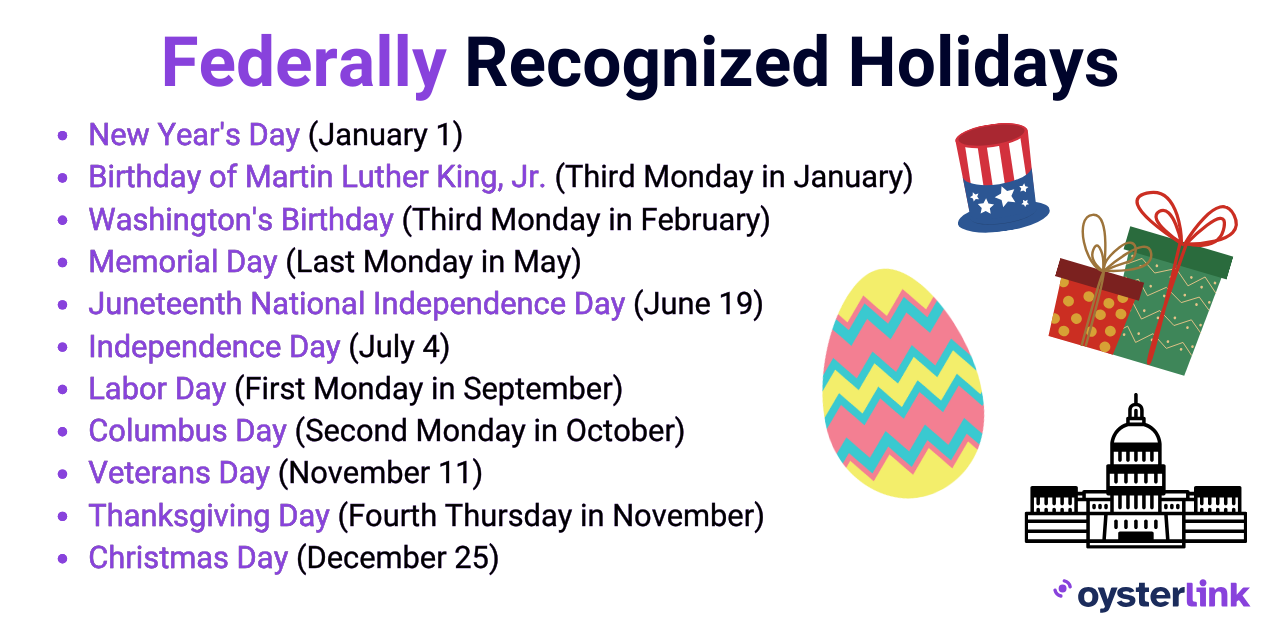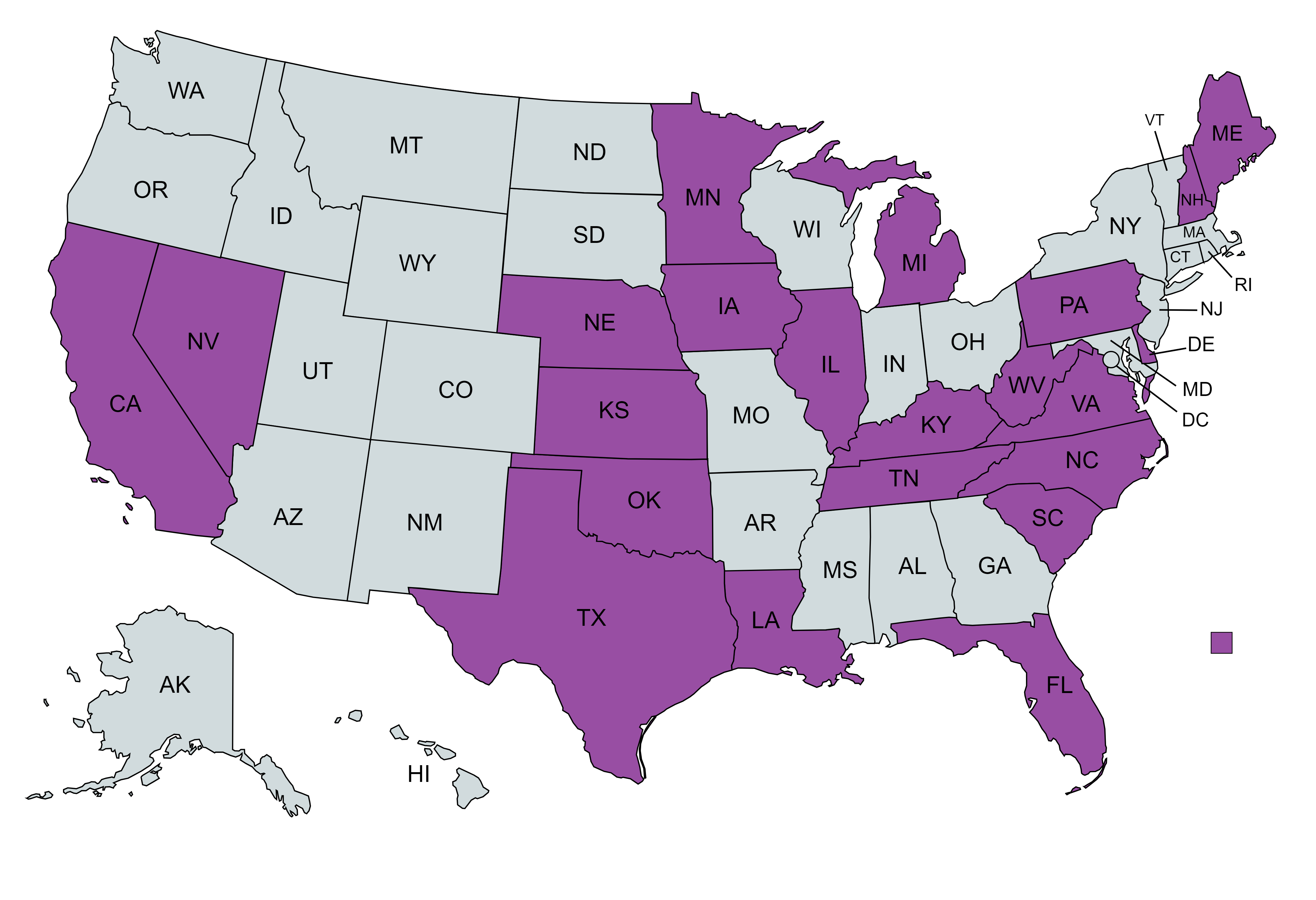Private businesses in the U.S. aren’t required to offer paid time off (PTO) to their employees. That said, many employers do so to gain a competitive edge in the job market. As an employee, you can negotiate with your employer to get PTO and establish work/life balance that you need to perform well and live healthily.
Keep reading to find out more about paid holidays, how many there are and what benefits they offer for both employers and employees.

What Is a Paid Holiday?
A paid holiday is a cherished aspect of employment that provides workers with the opportunity to enjoy a day off while still receiving their regular pay. These special days off, also known as public or statutory holidays, play a crucial role in maintaining work-life balance and acknowledging the importance of rest and recreation.
Currently, there are no laws in effect in the U.S. that require an employer in the private sector to provide PTO to their employees. Instead, the federal government regulates minimum wage and overtime pay. Considering that states also have minimum wage requirements, the workers are entitled to a higher pay, if the state minimal wage exceeds the federal minimal wage.
Despite the fact that there are no laws which regulate days off, 79% of individuals in the private sector had access to paid vacation in 2021, according to the Bureau of Labor Statistics. However, there is still room for improvement, considering there are 11 federally recognized holidays in the United States.
Why Are Paid Holidays Important?
Lack of federal regulation can make the logistics of paid holidays confusing. Still, it would be a mistake to underestimate their importance considering that 70% of workers like the idea of an unlimited PTO. It is up to the employer to decide whether and how much PTO they are going to offer their employees, but it would be unusual for an employer to not offer any.
Due to their importance among the employees, PTO is regularly used to gain competitive advantage and it is one of the most important perks for applicants looking to find new employment.
In fact, most employers offer 6 standard paid holidays per year.
How Does a Paid Holiday Work?
In the private sector, holidays work based on the agreement between employer and the employee, and it isn’t regulated by law. It is a bit different for federal workers.
Employers in the private sector can refer to the Fair Labor Standards Act (FLSA), which establishes minimum wage, overtime and child labor standards applicable to all employees working in the private sector. The following are not required by the FLSA:
- Absentee pay (vacation, holidays, or sick days)
- Meal and rest periods
- Increased wages for weekends or holidays
- Raises or benefits
- Discharge notice or immediate payment to terminated employees
This is why paid holidays can be used as a competitive edge in the job market: applicants are more attracted to positions that offer PTO and some would choose paid time off over a bump in salary.
Paid vs. Unpaid Leave
Unpaid leave refers to the employee’s absence from work for which they receive no compensation. Although most companies will offer paid time off, there are also ways in which they can install unpaid time off policies, or situations in which unpaid time off is warranted. Some of the ways in which employees can receive unpaid time off are as follows:
Company Policy
Employers can offer UTO to support workers that require more flexibility. This can refer to hourly workers or part-time employees, but salaried workers can request UTO too and discuss the specifics with their employer.
Family and Medical Leave Act
The Family and Medical Leave Act (FML) was passed in 1993. It is designed to help workers take time off for family or medical reasons. It applies to all public agencies, public and private elementary and secondary schools and companies with fifty or more employees. As per FMLA, all employers must provide twelve weeks of UTO to their employees for the following reasons:
- Birth and care of a newborn child
- For placement of the employee’s child for adoption or foster home
- To help an immediate family member with a health condition
- For medical leave, if the employee is unable to work due to a medical condition
Furlough
A furlough is a temporary, unpaid leave of absence or reduction in work hours that an employer may implement during challenging economic times or unforeseen circumstances. Unlike other forms of unpaid time off, furloughs are typically initiated by employers to address short-term financial challenges while retaining employees for future work.
How Do Paid Holidays Affect Hourly vs. Salaried Employees?
Salaried employees work for an annual salary. Hourly workers are paid by the hour.
Since employers aren’t required to offer paid holidays to their employees, there isn’t a difference from the legal standpoint between salaried and hourly workers. In other words, salaried workers aren’t guaranteed PTO and their employer decides whether they give them time off and whether said time off is paid.
Paid Holidays in the US
The federal government recognizes the following 11 holidays:
New Year’s Eve
New Year’s Eve, celebrated with joyous festivities, marks the year’s end and the anticipation of a fresh start. It’s a time for friends and family to come together, counting down the seconds until midnight, often with fireworks lighting up the sky.
On this day, state government offices, post offices, banks and schools are officially closed. Many private businesses may also be closed, while some service occupations, such as retail and grocery stores or restaurant chains, might remain open. Public transportation may operate on modified schedules.
Date: December 31st
Memorial Day
Memorial Day is a solemn occasion dedicated to honoring and remembering the men and women who made the ultimate sacrifice while serving in the U.S. military. Communities come together for ceremonies, parades and visits to cemeteries to pay their respects.
On this day, many government offices, banks and schools are typically closed. It’s common for businesses to give employees the day off. Retail stores may remain open, offering special sales. Memorial Day also marks the unofficial start of the summer season, so many people take advantage of the long weekend for outdoor activities.
Date: Last Monday in May
Independence Day
Independence Day commemorates the historic adoption of the Declaration of Independence in 1776. Americans express their patriotism with grand fireworks displays, lively parades and gatherings with family and friends, celebrating the nation’s hard-won freedom.
Independence Day is a federal holiday, meaning most government offices, banks and schools are closed. Private businesses, however, often operate on a reduced schedule. Many people have the day off, enjoying picnics, barbecues and patriotic festivities.
Date: July 4th
Labor Day
Labor Day serves as a tribute to the contributions of American workers to the nation’s prosperity. It provides an opportunity for relaxation, quality time with loved ones and a chance to bid farewell to summer as autumn approaches.
On Labor Day, government offices, banks and schools are typically closed. Private businesses may follow suit, allowing employees a long weekend. It is one of the holidays where retail stores often offer special discounts and sales.
Date: First Monday in September
Thanksgiving Day
Thanksgiving is a cherished time for families and friends to come together. It centers around a festive meal where gratitude is expressed for the year’s blessings and the bountiful harvest. The holiday is marked by delicious feasts and a spirit of togetherness.
On Thanksgiving Day, government offices, banks and most schools are closed. Private businesses may also close or have reduced hours. Retail stores often prepare for Black Friday sales, opening late on Thanksgiving evening.
Date: Fourth Thursday in November
Christmas Day
Christmas Day is a beloved holiday that celebrates the birth of Jesus Christ. It is observed with religious reverence, gift-giving, elaborate decorations and gatherings that foster warmth and joy among family and friends.
Christmas Day is a federal holiday, so government offices, banks and most schools are closed. Retail stores are typically closed on Christmas Day and some businesses in the private sector give a day off to their employees.
Date: December 25th
Martin Luther King, Jr. Day
Martin Luther King, Jr. Day pays tribute to the iconic civil rights leader’s legacy in the ongoing fight for racial equality and justice. On Martin Luther King, Jr. Day, government offices, banks and most schools are closed. Private businesses may choose to close or remain open.
Date: Third Monday in January
Juneteenth National Independence Day
Juneteenth commemorates the end of slavery in the United States and serves as a day of reflection on freedom, African American heritage and cultural festivities that highlight the journey to equality. Government offices, banks and schools are typically closed and many private businesses choose to honor this holiday.
Date: June 19th
Columbus Day
Columbus Day celebrates Christopher Columbus’s arrival in the Americas in 1492.
Columbus Day is a federal holiday, resulting in government office closures. Banks may be closed or have limited services. Private businesses, including retail stores, may choose to close or remain open based on their policies and locations.
Date: Second Monday in October
Veterans Day
Veterans Day is a day of profound gratitude and honor for all veterans who have served in the U.S. Armed Forces. Communities and organizations come together to express appreciation for their sacrifices. On Veterans Day, government offices, banks and most schools are typically closed. Private businesses may choose to close or remain open based on their policies.
Date: November 11th
George Washington’s Birthday
Also known as Presidents’ Day, this holiday celebrates the birthdays of George Washington and Abraham Lincoln, two pivotal figures in American history. It honors their enduring contributions to the nation.
George Washington’s Birthday results in government office closures. Banks may be closed or have limited services. Private businesses, including retail stores, may choose to close or remain open based on their policies and locations.
Date: Third Monday in February
6 Major Holidays in the US
In the United States, there are several major holidays that hold special significance and are widely celebrated across the nation. These holidays not only bring people together but also provide an opportunity for employees to enjoy some well-deserved paid time off.
In 2022, 21% of employees working in the private sector enjoyed six paid holidays and 3% of employees had 14 days of paid holiday leave in the U.S. Employers often recognize the importance of these holidays by offering their employees time off to celebrate and spend quality time with their loved ones. Below is the list of 6 holidays for which employers often provide PTO:
- New Year’s Day
- Independence Day
- Labor Day
- Thanksgiving
- Christmas
- Memorial Day
Other Major Holidays in the US
There are also holidays which aren’t recognized on the federal level, but are observed by several states. Some companies opt to offer the following holidays for potential PTO:
The Day After Thanksgiving
Although not recognized as a federal holiday, the Day after Thanksgiving (also known as Black Friday) is celebrated in twenty-two states such as Florida, California, Illinois etc.
Companies and state institutions sometimes offer this day as a holiday to their employees, although they are not legally obligated to do so.

Easter Sunday
Easter Sunday celebrates the resurrection of Jesus Christ following his crucifixion. It commonly involves Easter egg hunts and egg decorations.
Although Easter Sunday is not a federal holiday, stores across the U.S. might not be open or, if they are, they might be working on limited schedule. Although public transportation should run its usual course, it would be best to check when Easter Sunday hops over.
Good Friday
Good Friday comes two days before Easter Sunday. While federal offices remain open since Good Friday isn’t a federal holiday, most schools and universities are closed. Retail stores and shops probably work on a shortened schedule and some states recognize it as a state holiday.
For example, Good Friday is a state holiday in Hawaii, while in Connecticut it is a day of fasting and prayer.
Christmas Eve
Christmas Eve is another holiday that is celebrated in eleven states, but forty states mark a Christian Observance. Since it falls right before Christmas, companies often offer a half-day, as they close the office in the second part of the day for Christmas parties or celebrations.
New Year’s Eve
New Year’s Eve, celebrated on December 31st, marks the exciting countdown to the start of the new year. It’s a time for lively festivities, parties and spectacular fireworks displays that light up the night sky.
While not a federal holiday, New Year’s Eve is widely celebrated across all states, with many businesses and state institutions offering it as a holiday to their employees. Public transportation typically runs its usual schedule, but it’s advisable to check for any specific arrangements in your area as you prepare to welcome the new year.
Paid Holidays in Private vs. Federal Sector
We already mentioned that workers in the private sector don’t have guaranteed paid holidays. Whether they get holidays off and whether they are paid is between the employer and the employee.
However, most federal employees are entitled to PTO when not working on one of the federally recognized holidays. Additionally, federal workers in Washington, DC, have an additional opportunity for a PTO on Presidential Inauguration Day. This only applies to the residents who would be scheduled to work in the “Inauguration Day” Area.
Presidential Inauguration Day
Presidential Inauguration Day is a historic event that marks the swearing-in of the President of the United States. The day is filled with grand ceremonies, including the presidential oath, inaugural address and a parade. People from across the country gather in Washington, D.C., to witness this significant moment in American democracy. It symbolizes the peaceful transition of power and the beginning of a new presidential term.
Many federal government offices, particularly those in the Washington, D.C. area, may close or operate on a modified schedule due to the significant security measures and road closures associated with the inauguration. However, essential services such as public safety, transportation and security remain operational.
Date: January 20th, every four years
Benefits of a Paid Holiday
According to the Bureau of Labor Statistics, more than 79% of workers have access to PTO, while 45% have access to paid personal leave. Getting time off is essential to avoid burnout and to motivate your employees to bring their best self when they clock in in the morning. That’s not to say that there aren’t benefits to offering paid holidays outside of the break itself. Take a look below at some of the benefits of paid time off for both employees and employers.
Benefits for Employees
Reduced Burnout
Maintaining a healthy work-life balance is essential for preventing burnout, which can have detrimental effects on both employees and employers. Paid time off plays a vital role in reducing burnout by allowing employees to take much-needed breaks and disconnect from work-related stressors. When employees have the opportunity to recharge, they return to work feeling refreshed and less susceptible to the physical and emotional exhaustion associated with burnout.
Better Work/Life Balance
PTO enables employees to strike a healthier balance between their professional and personal lives. It offers the freedom to spend time with family, pursue hobbies, or simply relax. This balance is essential for overall well-being, reducing burnout and fatigue. Employees with a better work/life balance tend to bring a more positive attitude to work, ultimately contributing to a more harmonious workplace.
Boosted Morale
A PTO policy that acknowledges the importance of rest and relaxation sends a clear message that employers care about their employees’ well-being. This recognition can significantly boost morale within the workforce. When employees feel valued and supported, they are more likely to be engaged, collaborative and enthusiastic in their roles. A positive morale also contributes to a more pleasant and productive work environment.
Increased Job Satisfaction
Access to paid time off is a critical factor in job satisfaction. Employees who can take regular breaks to unwind and recharge are generally happier with their positions and more committed to their organizations. Higher job satisfaction leads to reduced turnover rates, as employees are more likely to stay with a company that acknowledges their needs and provides a supportive work environment.
Reduced Stress
PTO offers employees the opportunity to manage stress effectively. Extended periods away from work can help alleviate the physical and mental strains associated with demanding job roles. Reduced stress levels lead to improved mental health and overall well-being.
When employees return from PTO feeling refreshed, they are better equipped to handle workplace challenges, making them more resilient and better contributors to their organizations. Employers benefit from reduced absenteeism and improved employee health and longevity.

Benefits for Employers
Offering paid vacation to employees isn’t beneficial only for their mental and physical well-being. Healthy workers are more likely to provide quality work and more and more individuals are now directing their attention to less-stressful jobs.
In 2022, over 4 million US citizens quit their job every month. This number is understandable considering the growing amount of stress associated with contemporary work. In fact, the World Health Organization listed burnout (burn-out) as an “occupational phenomenon.”
It appears as the result of a chronic workplace stress and it is characterized by low energy, negative feelings towards one’s job and reduced efficacy in the workplace.
Reduced Unscheduled Absences
Implementing a structured PTO policy helps reduce unscheduled absences, as employees are more likely to plan time off in advance. This predictability allows employers to schedule workloads more efficiently and minimize disruptions caused by unexpected employee absences, which can be costly and disruptive to operations.
Competitive Advantage
Offering a robust PTO package can be a competitive advantage in attracting top talent. Job seekers often consider a company’s benefits package, including PTO policies, when choosing where to work. A generous PTO policy can make your organization more appealing to potential employees, helping you recruit and retain skilled professionals.
Employee Retention
PTO is a valuable tool for retaining experienced employees. When employees feel that their work-life balance is respected and that they have opportunities for rest and relaxation, they are more likely to stay with their current employer. High employee retention rates save companies time and resources associated with recruiting and training new staff.
Lower Costs
While offering paid time off incurs some costs, such as paid leave and temporary staffing during employee absences, it can lead to cost savings in the long run. Reduced turnover and the associated recruitment and training expenses, along with the benefits of a healthier, more productive workforce, can ultimately lead to lower overall costs for employers.
Higher Morale
A PTO policy that supports work-life balance and recognizes the importance of rest can contribute to a positive workplace culture and higher employee morale. Employees who feel valued and well-cared for by their employer are more likely to be engaged, committed and enthusiastic in their roles.
High morale often leads to better teamwork, creativity and problem-solving, all of which can benefit the organization’s success.
Paid Holiday FAQ
Is Memorial Day a paid holiday?
Memorial Day is not a federally mandated paid holiday in the United States. Whether it is a paid holiday depends on individual company policies and employment contracts.
What holidays do you get paid time and a half?
The holidays for which employees receive paid time and a half (overtime pay) can vary by employer. It typically includes recognized federal holidays, but specific policies vary widely in the private sector. Federal workers are compensated according to the federal law.
What Is a Floating Holiday?
A floating holiday is a day that employees can take off at their discretion, often to observe a holiday or special occasion of their choice. It is called a “floating” holiday because it can float to whatever date the employee chooses.
What are the federally recognized holidays in the US?
Below is the list of federally recognized holidays in the United States:
- New Year’s Day (January 1)
- Martin Luther King, Jr. Day (Third Monday in January)
- Washington’s Birthday (Presidents’ Day) (Third Monday in February)
- Memorial Day (Last Monday in May)
- Independence Day (July 4)
- Labor Day (First Monday in September)
- Columbus Day (Second Monday in October)
- Veterans Day (November 11)
- Thanksgiving Day (Fourth Thursday in November)
- Christmas Day (December 25)
- Juneteenth National Independence Day (June 19)
- Should the employer provide employees with time off on holidays?
Employers aren’t obligated to provide paid holidays to their employees, although many choose to do so to gain a competitive edge on the market and to attract top talent among applicants.
How many paid holidays do most people get?
The number of paid holidays that most people receive can vary widely depending on their employer, industry and location. It’s important to note that part-time or hourly employees may have different holiday benefits compared to full-time employees.
Additionally, the number of paid holidays can also be influenced by state and local labor laws. To determine the exact number of paid holidays one is entitled to, employees should refer to their employment contracts or company policies and consult with their human resources department.
Should the employers provide employees with time off on religious holidays?
Employers are not obligated to provide time off for religious holidays, but they are encouraged to make reasonable accommodations for employees’ religious practices and observances, as required by law.
Is Juneteenth a paid holiday?
Whether Juneteenth is a paid holiday depends on the employer and their policies. Juneteenth, which commemorates the emancipation of enslaved African Americans in the United States, was recognized as a federal holiday on June 17, 2021, through the Juneteenth National Independence Day Act. However, the designation of Juneteenth as a paid holiday for employees varies from one employer to another.
Which country has the most paid holidays?
The country with most vacation days is Iran, sitting a total number of fifty-three vacation days. Iran is followed by San Marino (46) and Yemen (45). Countries with the least amount of paid vacation days are Micronesia (Nine), Nauru (10) and the US (11).
Are Employees Entitled to Extra Pay for Working on a Holiday?
As we mentioned before, private employers don’t have to offer their employees additional pay for working on a holiday. While that might seem unfair, it also allows employers to offer a more competitive benefits and salary package.
On the other hand, federal workers do stand to gain a bit, provided they are willing to spend a holiday working.
Federal employees who don’t work on a public holiday receive their regular pay, for the regular number of hours they would work, if they were on the job. On the other hand, “holiday work” refers to federal employees who perform their regular duties on a holiday. Every individual who performs work on a holiday is entitled to added “premium pay” which is equal to the employee’s basic hourly rate. In other words, employees who work on holidays receive their basic pay and premium pay for each hour of work, effectively doubling their wages during holidays.













